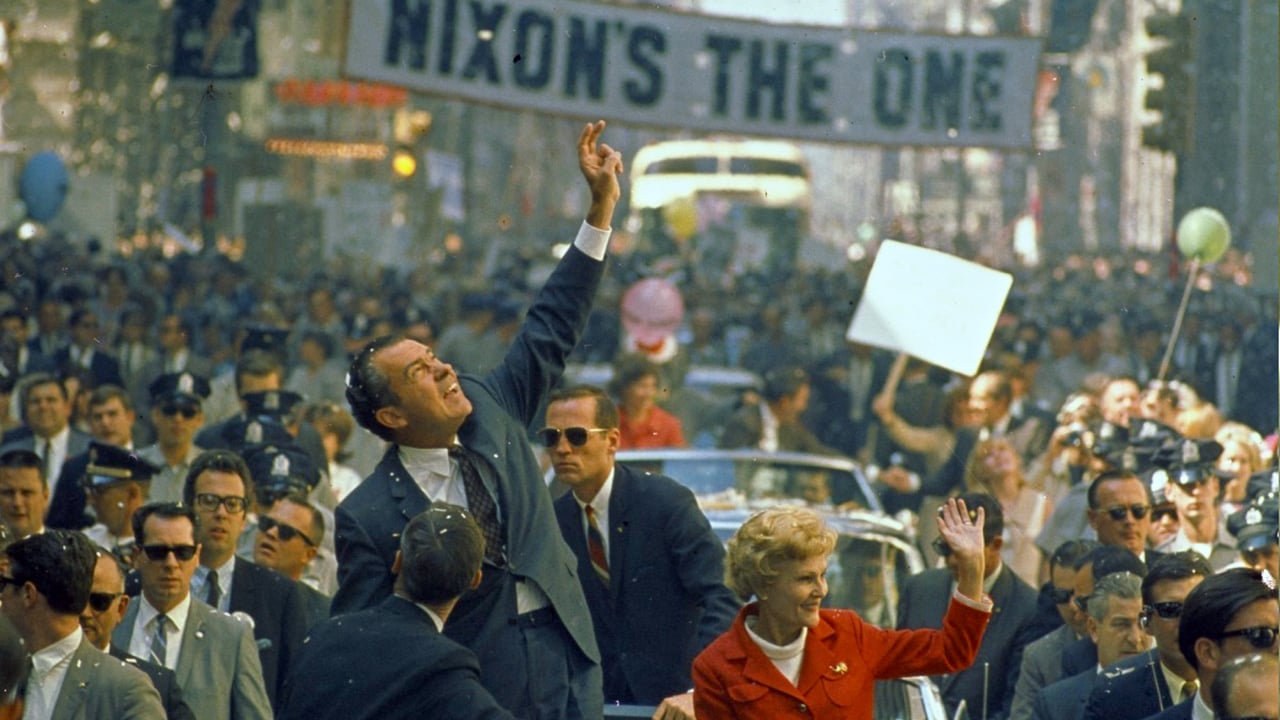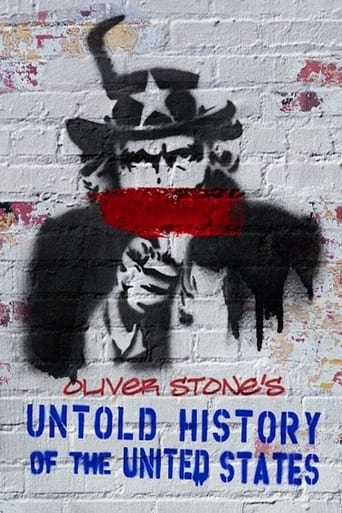

That was an excellent one.
... View MoreOverrated and overhyped
... View MoreI think this is a new genre that they're all sort of working their way through it and haven't got all the kinks worked out yet but it's a genre that works for me.
... View MoreThis movie tries so hard to be funny, yet it falls flat every time. Just another example of recycled ideas repackaged with women in an attempt to appeal to a certain audience.
... View MoreAs a Vietnam veteran with a number of outstanding documentaries and feature films behind, especially "The Platoon", "Born 4th of July", "JFK" and "Alexander", Oliver Stone has an epic sobriety that can fathom any historical problem. In this series, he has challenged the greatest historical problem of all, which is America.His main ambition with this series seems to have been to pinpoint the major American political mistakes since 1944, when everything went awry as Henry Wallace was not allowed to be a presidential candidate but was more or less out-manoeuvered by a foul coup, although he had been Roosevelt's vice president during his first three mandate periods. Harry Truman was pushed in as his last vice president to suit other minds than Roosevelt's.And then starts the dreary saga of the terrible horror tale of fatal American blunders affecting the whole world, starting with the use of the A-bomb, which Harry Truman rejoiced at, as if it was something to be proud of while it introduced something America hadn't experienced earlier on an international scale, namely dishonour.That triggered the inhuman nuclear race, while the greatest catastrophe during these 70 years of course was the assassination of the Kennedys. There everything went truly wrong with America, as his successor Johnson brutally reversed Kennedy's decision to get out of Vietnam before it was too late to instead turn it a decade of inhuman devastation of all life in Vietnam, comparable with the worst atrocities of the second world war.That part of the series, chapter 7, is probably the worst, the most horrible and upsetting, as it reveals the US drastic reverse from the enlightened "Camelot" of the Kennedys to the blatant barbarism of the Johnson-Nixon years, one worse than the other.Also Reagan gets his due as a brilliant facade to an abyss of ignorance and carelessness, ruining the one universal chance we had for a total nuclear disarmament as Gorbachev actually tried to take that initiative, while Reagan preferred his "Star Wars". His stupidity was only later exceeded by the minor Bushman's.In brief, it's a terrible settlement with an America that blew all its chances for its preference for lies, illusions and delusions, mainly motivated by reckless and inhuman greed that ignored and drove over all human values for the sake of the progress of the universally destructive juggernaut of power greed.Fortunately the series is not all dark and hopeless, as there are quite a few martyrs on the way that are dug up and remembered, foremost the Kennedys, Gorbachev and Henry Wallace, but there are many others, as well as there are many other scoundrels unmasked and living still today. The series is admirably neutral all the way, no conspiracy theories are even hinted at, the tone is objective, condoling or compassionate but never biased or passionate. It's the most admirable historical documentary I have seen, especially since its topic is the most difficult imaginable.
... View MoreI watched it knowing it would not be a pro-America take on world events. I am interested in raw truth, even if it offends or challenges my world view. However, this is nothing more than typical anti-American propaganda aimed at dissuading traditionally conservative opinions.There are obviously many opportunities to question the historical international policies of America. Probably beginning with our triumph in World World Two, America and its interests have, at times, been at odds with various parts of the world. I have no problem with reviewing these times through the lens of would be adversaries. Stone goes beyond an attempt at raw truth and wavers into the land of propaganda. It is ironic that he praises dictators, especially Russian communist leaders, while at the same time attacks traditionally conservative ideas of smaller government. Every widespread case of oppression and genocide has been conducted by Governments, so I am at a loss as to why he or anyone else on the side of peace isn't fighting for less Government, less oversight, and more privatization.I was initially excited to watch each episode - but in the end I was disappointed to see an opportunity lost to politics and propaganda.
... View MoreFor those aware of history, politics and culture, we need to step back and see what our world really is. You will have both sides praising and condemning this series. Conservatives are angered by an unpatriotic view. Revisionists are pleased by a view but claim it is told and unoriginal.Exactly what does untold mean? Some people scoff and say, well it has been told enough. But the definition of untold isn't "never told". Perhaps "Less So Stories" might come to mind. Less Told is the meaning in this case. If you were driving a car and met in an accident, of course, it's the other guy's fault. You don't tell the other driver's story. Thus, Stone offers instead an apologetic version of history.In the world view, however, this film isn't really leftist or liberal, but probably slightly left to the center. Most Americans are on the right. Just like Saudi Arabia is on the right economically and socially, the US is far right economically and slightly left socially. Left socially and left economically are, for example, Scandinavian countries. Australia is socially on the left. China is economically right (like US, very capitalistic). In the world view, this series is actually slightly left. Not much off the center, really. Most people in the world will see this as fairly accurate but it's hard for traditionalist Americans to swallow. But it's also has some small lumps that make it sometimes hard to swallow. For one, Oliver Stone comments on a traditional political leadership history, not a social or economic history. For the most part, this series is quite truthful although just like any version of history, it represent opinion and conjecture. Some historians like to view history as a series of movements or struggles. Stone views history as shaped by powerful individuals. But often, it isn't single figures but movements that shape the world. Another lump. Stone also uses his familiarity of movies as his comfort zone. Showing clips of films to depict history may not be the best way to suggest actual political course of events but how we interpret them. History and films, after all, are merely opinions and interpretations of events. Oliver, nice effects to show those clips, but they are movies. Give a few more facts to back up the argument.I wish Stone took this one step towards understanding movements. He makes the case at times for that. Celebrating Wallace or JFK as a hero for the common person and for world peace. But what drove Truman or Reagan the other way? As Stone mentions, it's often who one listens to. Advisors and those closest to power often help shape history as presidents cannot entirely shape policies on their own.Stone may well do one step better by focusing on the influence of movements. How the wealthy classes or hardliners/militarists shape American foreign policy. Noam Chomsky who was cited in this series, often depicts history as class struggles. At times, the common man seeks redress from oppressors and at other times, the wealthy classes dominate control. Historically, due to American capitalism and lack of upheaval, it has been the wealthy classes that control the nation's direction. The recent electoral victory of Trump over Clinton confirms the power of wealth. Stone's historical message is: those who are closest to power and wealth wield greater influence and will seek to protect their interest. Those who don't want change and stand to lose the most, will resist the changes sought by the middle and lower classes. Stone implies JFK made enough enemies and mysterious assassinations of the 1960s were instigated by those resisting change.But Stone brings up excellent points of what truly is important: the welfare of ordinary people around the world. Therefore, he vilifies Nixon for getting more Americans killed than Johnson in Vietnam. He points out that Johnson dropped more bombs on Vietnam than the US did on Germany in WW2. Some estimates as many as 1.5 to 3 million civilians died in Vietnam. The same is true for the US invasion of Iraq by G.W. Bush were again, nearly a million were killed.Do American presidents have their priorities wrong killing people in a third world country that cannot hurt the most powerful country? Is it really for the protection and security of America?In summary: a brilliant, provocative, slightly flawed series worth seeing with an open mind.
... View MoreThe whole thrust of this and much of the content reminds me of the line from Stone's own JFK when going over some initial pieces of potential evidence on Lee Harvey Oswald and the JFK assassination conspiracy: "There's a lot of smoke here, but where there's smoke, there's fire." This series, a major work for Oliver Stone, gets going through the premise that Henry Wallace, a true progressive in the early 1940's democratic party, could have been a true force for change but was shut out of the 1944 convention, leading to Harry S. Truman as FDR's newest vice president. The 'would-be' part of it is certainly intriguing, and the evidence seems to have credibility (Stone narrates it all), but even if it's phooey and the claims against Truman may be harsh, the fact still stands on who dropped the first nuclear Atomic bombs on a (at the time enemy) country, leading to a nuclear arms race and the Cold War for decades to come.There's so much here over the course of some ten or more hours that it may be hard to all take in at once. It may not be that kind of experience, perhaps better to not binge-watch but take in over a week or several nights. It's a full course meal of information which is certainly not something that is ra-ra pro-American (but you should hopefully know that, even coming from his quintessential film, Platoon, where the climax of that was the Americans losing to the Vietnamese in a brutal battle). There's much that you also won't possibly expect that isn't necessarily *all* about the United States which is the fascinating part; just how much Russia was crucial in World War 2 and how their casualties were so catastrophic, but yet eclipsed in the pages of history by other countries losses. Or the details surrounding just how damn close the US did come to war with Russia over the Cuban missile crisis. Or so many other, nasty things.I think Stone is coming from a hopeful place here, and his damnations and critique aren't from a complete crank and blow-hard. He may have that in him, but his intentions are pure and with an intent of consciousness expansion: get you thinking about things, maybe you go find information for yourself, and don't always tow the line on everything you're told (not just Americans, around the world is the key point I think, though especially Americans). It's an overview of the past 70 years as only Oliver Stone can do it, and it's exhilarating, befuddling, infuriating, perplexing, terrifying, sad and perhaps questionable stuff. But that's better than something you can easily digest with your stick-in-the-mud grandpa, right?
... View More